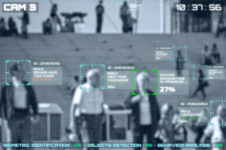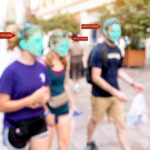Australia’s Future Is Nationwide Facial Recognition Surveillance

Around one million Uyghur people are being detained right now in political re-education camps in China. This mass incarceration program of the majority Muslim people is being carried out in their homeland, which is currently referred to as the Chinese province of Xinjiang.
This far-western region is of growing strategic importance to Beijing, due to its belt and road initiative. And a draconian data collating system – known as the Integrated Joint Operations Platform – has been rolled out locally. It makes the province one of the most heavily surveilled areas on Earth.
In its attempt to suppress the Uyghurs to the point cultural genocide, the Chinese Communist Party uses facial recognition technology as part of its surveillance system. And Four Corners recently revealed a number of Australian universities have assisted China in developing this technology.
However, as Electronic Frontiers Australia (EFA) pointed out in a press release on the day following the exposure of the Australian links, “facial recognition systems, like those in the Four Corners report, are already being rolled out in Australia”.
And while this highly flawed method of identifying people using digital technology has been trialled in a number of ways in this country, the federal government has plans to roll out an all-pervasive system that will have the ability to link CCTV cameras nationwide with all citizens’ ID photos.
No paranoid fear
“It’s hard to see how an always-on real time facial recognition system isn’t arbitrary interference with our privacy, just for daring to take a walk outside,” EFA board member Justin Warren told Sydney Criminal Lawyers.
“We heard just this week of the myriad occasions when agencies broke the laws that were supposed to safeguard our privacy with data retention,” the digital rights activist added. “The same thing will happen here.”
At an October 2017 COAG meeting, all states and territories signed on to the Turnbull government’s proposal to establish the Capability: a system that will provide law enforcement and intelligence agencies with the ability to match identification photos with CCTV footage images in real time.
The government has been operating a manual version of the Capability since November 2016, which initially ran on citizenship photos alone. But, the full version will involve the linking of all federal and state citizen identification image databases via a central hub.
“Total surveillance violates a fundamental freedom: the freedom to be left alone,” Mr Warren underscored. And he pointed to article 12 of the Universal Declaration of Human Rights, which outlines that no one should be subjected to “arbitrary interference” with their privacy.
On an unsuspecting public
According to Warren, informed consent is not of concern to the authorities, as facial recognition systems are being “quietly pushed through” with no public consultation. And he warned that one only needs to look at how the technology is being applied in China to realise it’s of grave concern.
Facial recognition technology has been trialled at both Sydney and Canberra airports. It was incorporated into surveillance systems at last year’s Gold Coast Commonwealth Games, where it failed miserably, even when its scope was broadened from targeted use to general policing.
Perth City council recently announced it’s about to roll out a trial, involving 30 cameras with the capability of recognising faces and tracking movements. While NSW transport minister Andrew Constance just suggested using the technology on public transport to streamline ticketing.
And as Queensland authorities are now keenly aware, this technology is hopelessly inaccurate. Widespread use by UK police found it misidentified innocent people 95 percent of the time. And it’s even worse when specifically used to target people of colour and women.
Gone, but not forgotten
Initially, a baby of former attorney general George Brandis, the Capability now falls into the Home Affairs’ remit. In February last year, minister Peter Dutton introduced the Identity-Matching Services Bill 2018, which establishes the surveillance system.
This piece of legislation, along with another bill that enables Australian passport information to be utilised in the running of the Capability, were both sent to the Parliamentary Joint Committee on Intelligence and Security for review early last year.
The dissolution of the 45th parliament in April caused both bills to lapse. But, it’s doubtful the nation has seen the last of the Capability. Since its return to power, the Morrison government has set about reintroducing a number of lapsed bills, so it’s likely these will be returned too.
Another firm indication that the Capability is still on the agenda is that after federal parliament dissolved, the Northern Territory delivered its budget in May, in which it included the allocation of $375,000 towards its part in the implementation of the facial recognition system.
Indeed, the Berejiklian government passed its Capability enabling bill last November. It makes all NSW citizens’ licence photos and associated information accessible nationwide, so it can be matched in real time with images taken from CCTV footage.
Taking back our rights
“Every Australian government for the past 20 years has enthusiastically expanded the power of the surveillance state,” Mr Warren continued. “And this one shows every indication of being even more enthusiastic, if such a thing is possible.”
Many of the surveillance powers that have been gifted to law enforcement and intelligence agencies have been contained in national security-counterterrorism legislation. And there’s now been 77 such bills passed at the federal level since 9/11.
As the recent revelations about the metadata regime and the AFP press raids reveal, laws that have been passed ostensibly to deal with terrorists are actually being turned upon citizens who pose no terror threat whatsoever.
Mr Warren posits that if Australians don’t want to continue to watch their civil liberties incrementally eroded, as well as have every aspect of their lives monitored, then they’re going to have to demand that it’s all brought to an end, as asking politely hasn’t been working.
“Otherwise, we’ll just have to spend our entire lives indoors. Until they insist on installing cameras in there as well,” Mr Warren concluded. “Perhaps there are terrorists hiding under our beds, next to the communists.”







